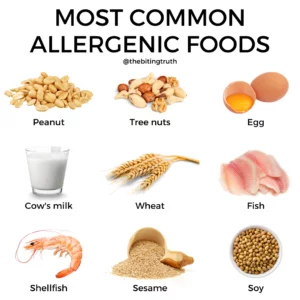Step-by-Step Guide To Introducing Allergenic Foods To Your Baby


Rates of food allergies among children are the highest they’ve ever been, with 1 in 10 Aussie kids under the age of 12 months having a food allergy.
Introducing allergenic foods can be a highly stressful time for parents; however, delayed introduction of these foods has been shown to increase the chance of developing a food allergy.
We’ve created this step-by-step guide to help you introduce allergenic foods to your baby safely, giving them the best possible chance of being food allergy free.
1. Offer allergenic foods before the age of 12 months
The latest research indicates you should introduce all common allergenic foods before the age of 12 months to reduce the risk of your baby developing allergies to these foods.
The most common allergenic foods, which account for 90% of all food allergy reactions, are:
- Peanut
- Tree nuts (i.e., all other nuts – almonds, cashews, etc.)
- Egg
- Cow’s milk (including yoghurt, cheese, butter)
- Wheat (e.g., bread, pasta, couscous)
- Fish
- Shellfish (e.g., prawns, mussels, squid)
- Sesame
- Soy

Although these are the most common culprits, keep in mind it is possible for a baby to have an allergic reaction to any food e.g., celery, mustard seeds, kiwi fruit.
When introducing solids, we recommend starting with some low risk foods like fruits and vegetables, as well as iron rich foods, as this can be less stressful. You can begin offering allergenic foods once your baby is successfully swallowing food.
Learning to eat solid foods takes time. Babies learn by watching their family eat, so giving your baby the same foods as the rest of the family will encourage them to eat many different foods.
2. Offer allergenic foods during the daytime
We recommend introducing allergenic foods during daytime feeds (i.e. morning or lunch) so that if your baby does have a reaction, it’s easier to seek medical attention.
3. Introduce one allergenic food at a time
Offering one allergenic food at a time means if your baby does have an allergic reaction, it will be easier to identify which food caused the reaction.
There is no specific order in which you should offer allergenic foods. We usually recommend starting with the foods you eat regularly as a household, remembering the food needs to be age-appropriate (i.e. smooth, soft foods to start with then moving to more textured foods).
If baby has a family history of allergy, a good place to start is with a well-cooked egg, as there is evidence to suggest introducing egg before 8 months of age can reduce baby’s risk of developing an egg allergy.
4. Offer allergenic foods with a familiar food
Mix a small amount of the allergen in with a food your baby has already been introduced to, for example combining:
- Egg and avocado puree (to test egg allergy)
- Peanut butter and cauliflower puree (to test peanut allergy)
- Yoghurt and mashed banana (to test cow’s milk allergy)
- Couscous and broccoli puree (to test wheat allergy)
- Canned tuna and potato puree (to test fish allergy)
Make sure the allergenic food is well-cooked as this will reduce the chance of causing an allergic reaction.
5. Monitor for any reactions
Allergic reactions usually occur quickly, within minutes. Stop feeding your baby the offending food and seek medical attention if you notice any of the following:
- Difficulty breathing
- Vomiting
- Hives or welts on the skin
- Swelling of the lips, tongue, eyelids or face
- Paleness and floppiness
Keep in mind many foods can cause redness around the mouth where the food has touched the skin and that this does not usually indicate an allergic reaction.
6. Increase the amount of allergenic food offered
If your baby does not react the first time they eat the food, you can increase the amount you offer the second time. For example, 2 days after first introducing boiled egg you could increase from one quarter of a teaspoon to half a teaspoon of boiled egg, then perhaps a full teaspoon the next time. You can safely assume an allergen won’t cause a reaction after offering it three times in one week without event.
7. Regularly offer allergenic foods
Aim to introduce maximum one allergen a week. Once you introduce the allergen, have tested it a few times and there has been no adverse reaction, continue to offer the food regularly in your baby’s diet (i.e. at least twice a week). If the food is not offered regularly, reintroducing it to baby’s diet after some time has passed can increase the risk of your baby developing a food allergy.
Take home message
Once your baby has started solids, you can introduce allergenic foods. Follow the steps above to ensure the safe introduction of allergenic foods and to reduce the likelihood of your child developing a food allergy. This advice is relevant for all babies, particularly those with severe eczema, an existing food allergy, or a family member (parent or sibling) with allergies.
For further information:
- Nip Allergies in the Bub – A Food Allergy Prevention Project
- Allergy prevention – Australasian Society of Clinical Immunology and Allergy (ASCIA)
- Allergy & Anaphylaxis Australia
Enjoy more tips and tricks from our in-house Dietitians Anna and Alex – 6 Steps To Introducing Your Child To A New Food.
Only About Children can help your child to grow, make friends and explore the world.
Only About Children can help your child to grow, make friends and explore the world.
Related Reads


Advice For Selecting The Best Primary School For Your Child
Starting school for the first time is a huge moment in the life of your child, but also for you and your family! Finding the school that is the right fit for your family can be the first hurdle in this process. Here are some helpful tips to ensure that you choose the school that is the right one for you and your child:

The 5 Biggest Changes Starting “Big School”
The change from a prior to school setting to a primary school setting can be daunting and take some getting used to in the early weeks and months of your child starting. Here are some of the 5 biggest changes to expect when moving to primary school
